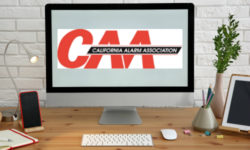Dangers of In-Home Monitoring: Why Central Station Operators Working From Home Is Risky Business
Distracted operators? Increased alarm contractor liability exposure? Forensic alarm expert Jeff Zwirn pokes holes in UL-827’s pandemic-induced standard exception.

(Image Credit: Syda Productions/stock.adobe.com)
In a world where peace of mind is mission-critical, in-home monitoring is nothing short of dangerous. Does it provide more safety and security to subscribers? No. Does it provide the central station operators with more redundant monitoring capabilities? No. Does it provide a better environment for no distractions to the operator? No. So what’s the rationale? You decide.
It is unclear, but in part, it’s to allow central stations to increase profitability by walking away from the core foundation of what the alarm industry has relied on since the 1800s — being The Central Station.
What happened to life-safety and security? UL-827’s adoption of allowing central station operators to monitor from their own apartments and homes is a decision that has the potential to create unheralded liability.
In the meantime, alarm contractors have already agreed to indemnify central stations when their subscribers use their services. Does the indemnification apply to the advent of in-home monitoring? Central stations will take the position it does. How many alarm contracting companies have thought about this new legal exposure?
In other words, if the central station operator is working from their own apartment or home and they receive signal(s), but no action is taken and/or if there is a delay in retransmission by the operator to the police or fire department and/or if there are other causes of action made by the plaintiff against the central station, soon thereafter, the alarm contractor will receive a demand and notice from the central station’s legal counsel/insurance carrier seeking indemnification in accordance with the dealer agreement you entered into with the central station.
Why would an alarm contractor want to increase their indemnification obligations as a result of in-home monitoring? What part of in-home monitoring provides more reliability to the alarm dealer and its subscribers than from within the four walls of a central station?
Yet with “the approval” through UL-827 (I was the only standard technical panel member on UL-827 who voted no) to allow central station operators to monitor homes and businesses from their own personal apartments and homes, a dynamic has been created that instantly changes the duties of alarm contractors forever.
At the same time, it significantly increases alarm contractor liability exposure as a result of knowingly or unknowingly adopting this practice. In fact, many alarm contractors using subcontracted central stations have still not been made aware of this change. In alignment with this concealment is that there are no plans to disclose in-home monitoring to millions and millions of subscribers. Why?
Because central stations know that consumers are not going to want their alarm systems monitored from an operator’s apartment or home, compared to keeping operators where they belong, within the protected, redundant, supervised and no-distraction zone of the four walls of the central station.
Do consumers and business owners have a right to make informed choices? Where in your contract does it state that you have the right to provide in-home monitoring services instead of central station monitoring? When you sell alarm systems to consumers, how do you describe alarm system monitoring?
Do consumers have a right to rely on your representations? If you were to call each one of your subscribers and tell them that from now on, their systems will be monitored outside of the four walls of the central station and into the personal apartments and homes of central station operators, what would you think they’ll do, embrace this change?
From my interviews with subscribers, this is not the feedback that I received. On the contrary, the subscribers told me that they would cancel their service and/or they would switch to an alarm company that would not provide in-home monitoring, or just as troubling, they wanted the alarm contractor to lower their central station recurring charges.
Anytime an alarm company makes fundamental changes in the services contracted for, it needs to be disclosed to each subscriber so that they can make informed choices. Failure to disclose any change in services, let alone ones that do not provide consumers with more security, is a recipe for disaster that many in the central station industry are the architects of.
In other words, when you put profitability over the safety and security of your subscribers while touting that you provide peace of mind for them and their family’s life safety and security, is not something that can be attained or sustained because the weakest link is the one that been distinctly created here through parties that decided the reward in their profits is worth the increased risks to their subscriber.
Notwithstanding, there is no reliable way to supervise operators working out of their apartments or homes remotely, there is no reliable way to remotely stop operators from being distracted on their cell phones or social media while “on duty,” and there is surely no way to solve the problem of losing connectivity and/or communications between the operator’s apartment or home and the central station.
If you enjoyed this article and want to receive more valuable industry content like this, click here to sign up for our FREE digital newsletters!

Security Is Our Business, Too
For professionals who recommend, buy and install all types of electronic security equipment, a free subscription to Commercial Integrator + Security Sales & Integration is like having a consultant on call. You’ll find an ideal balance of technology and business coverage, with installation tips and techniques for products and updates on how to add to your bottom line.
A FREE subscription to the top resource for security and integration industry will prove to be invaluable.









I think this is a great conversation to have and I am interested in hearing more from both the Central Station Community and Dealers that use their services. Outside of eliminating the Central Station completely, it is difficult for me to see how this is an economic equation vs. a labor issue. We know that labor resources have been tight and requirements for quarantining employees who test positive for covid must have impacted some of this decision making. Is it that the Central Stations prefer’s this model or is this a stop gap to address issues?
Howard, I wear two hats these days but in this case i am only speaking with my Rapid Response Monitoring hat on and not my TMA hat.
For some background working from home started as an industry initiative when COVID hit, at the time we were not officially defined as a necessary industry so in order to provide continuity this was put in place. Now fast forward to now and with the strain on hiring and the high cost of labor and real estate many organizations wanted to continue the use of Work From Home staff vs in office staff on a permanent go forward basis.
While there has been work on UL 827 to address the security and networking concerns you cannot possibly compare Working From Home as identical as Work From the Office, just think how many times on a zoom call does someone have a problem with connectivity or has a barking dog or screaming kid in the background.
Rapid Response has driven its stake in the ground and is committed to maintaining a Work From the Office model and have no plans in the foreseeable future nor have we in the past utilized monitoring operations staff working from home, we believe the potential risks and poor customer experiences outweigh the potential advantages and cost savings of Work From Home.
Other organizations have made the decision for them to have some or all of their staff working from home and are comfortable in doing it this way and that certainly a decision they can make for themselves .
For the wholesale industry the dealers that are using wholesale centers are also going to have to be aligned with the monitoring centers choices. Jeff Zwirn talks about notifications to stakeholders that accounts are being monitored from home and to me that certainly makes sense so if you are a dealer using a wholesale center you need to decide what works for you and your customer base. It is America and we all have choices here but whatever your choice is make sure you understand all the options and facts.
Morgan, I’m a big fan of the at-home option! The fact that UL is finally adopting some progressive measures to their standard should be music to our collective ears! Nearly every other industry in the world allows at-home work — financial institutions, credit card companies, healthcare, airlines, Amazon, etc. The proper deployment of technology allows companies to measure and oversee security, quality, and productivity of employees. If every other industry allows work from home, the central station industry is going to have a very difficult time competing for good employees if the only work environment allowed is the one locked behind Fort Knox. Central Stations who have figured out how to successfully manage at home agents are the companies who are recruiting and retaining the best talent in the industry! Central Stations that don’t allow their operators some sort of a work from home option seem to either be technologically deficient or have trust and control issues. The latter results in bad culture which ultimately could pose a greater risk to subscribers because of the resulting bad service delivery.
I once heard a wise man say, “If you’re not moving forward, you’re moving backward.”
Josh, all good points for sure, there are clearly differences between the two models, and there is certainly a lot of passionate people with their opinions as to how things can or should be done in a monitoring center.
I also believe that the employee part is a valid consideration such that employees need to feel valued, that they are safe and that they are not micromanaged, this was a major moving forward initiative for Rapid early on in the pandemic however at the same time, we are dealing with life, property and the concept of privacy. Everyone in the value chain has to weigh out the pros and cons and see if the ends justify the means.
A good analogy for me is childbirth, some people are very comfortable with having a baby at home with a midwife, it’s been done for centuries others want to be in the hospital because they want to be in a place where they know if there is a problem they have all the necessary people and resources to help if necessary.
Where i get concerned is who gets to make that choice, in the case of child birth ultimately the mother has to be the one that chooses where the child is going to be born, translate this to alarm monitoring do we as an industry owe the stakeholders that same consideration. By stakeholder i am referring to entities like a dealer thats using a wholesale center, the subscriber thats paying for the service and to perhaps to a lesser extent the AHJ which could be a fire marshal or insurance company, and do we have to make a distinction between working from home as a permanent application or only when a disaster hits or the Feds declare an emergency.
Today none of notifications of where the staff is sitting or even what country they are in is in any of the standards that we operate under such as NFPA or UL , maybe it should or maybe not, at the end of the day for some centers “just because you can doesn’t mean you should” is the way they think about it.
Over the next few years this will obviously cause spirited debates, I can see both sides and each one will have to decide what kinds of services they want to provide based on the customer experience, the risk factors and the codes governing the new paradigms
Morgan, thinking more on the analogy of at-home childbirth. The last thing we need is for a couple of guys like you and me opining about the potential risks and complications of childbirth, but I think we can both agree that in terms of medical procedures it carries significant risk. (And all 5 of my kids were born in the hospital by the way!) However, there are hundreds of other types of doctor visits with much lesser risk. That is why we are seeing the growing sectors of telehealth and remote patient monitoring. There are a lot of things that can be done from home — and don’t require the in-person doctor’s visit.
I think alarm traffic is very similar. There are varying degrees of complexity and risk. We both know that a high percentage of alarms are not that complicated and not that risky. There are those signals that are complicated or do involve fire and life safety. For that reason, we agree that those signals should be processed by operators in a UL listed central station. At AvantGuard we feel that the best approach is not one or the other meaning all operators in the central station or all operators working from home, but rather a hybrid approach. Some signals can be processed by operators working from home. Other more critical signals must be processed by operators in the central station.
Why I was the only one on UL’s 827 committee who voted No, on permanently allowing Central Station Operators to work from their home or apartment.
Keeping your password a secret is one thing, but keeping the change in how your monitor subscribers from within the four walls of a UL Listed to inside an operator’s home or apartments is reckless.. Why are you talking about comparing UL Listed Central Station Alarm Monitoring to at home Childbirth and financial services? Notwithstanding the foregoing you and other UL Listed Central Stations who have increased their profits at the expense of unsuspecting consumers have in doing so not provided any increase in safety, security, and reliability of the monitoring services you provide. In other words, what more are subscribers getting from you in exchange for your increased profits? Let’s be clear and as you know it’s absolutely nothing.
Against the foregoing backdrop, I will donate $5,000 to any charity of your choosing for the ability to call 250 subscribers of any one of your dealers and ask them certain questions about what they know as to how their alarm systems are being monitored in that now the operators are no longer working within the four walls of a fortified, redundant and no distraction zone UL Listed Central but instead work from their personal home or apartment; in order to see the realities of what kind of feedback I expect to get. Moreover, we can jointly work on the questions together before the process starts and I will also execute a confidentiality agreement as to who I call and the name of the dealer. Finally, you can have someone monitor the entire process and then we can harvest and disclose the results.
If you truly do not realize (which I quite frankly find it very hard to believe) that consumers are going to be outraged and consider this change of monitoring tantamount to a dramatic increase in risk and vulnerability to their families and businesses, my offer will educate you and solidify the reality of why not providing consumers with this mission critical information equates to not allowing them to make informed choices which is simply unacceptable.
Additionally, since you so highly tout how you are now monitoring subscribers from operators’ homes and businesses, are you ready, willing and able to immediately change all of your dealer agreements so that the dealer no longer has to indemnify AdvantGuard if an operator working from their home or apartment is claimed to be the proximate cause of the damages sustained in a loss?
Why is it that Avant Guard and others who highly tout the benefits of In-Home monitoring don’t advertise this to their subscribers and/or why don’t you require that your dealers do so?
Why is it that there is no place on the AdvantGuard website that shows photos of operators working from within their home or apartment? In fact, the photos on your website all appear to show operators working within the central station.
What reliable redundancies are there in place when a Central Station operator is working from their home or apartment and they lose internet connectivity and how long does it take to identify and fix this problem(s)?
Getting “permission” from UL to change the way you monitor subscribers is not a license to conceal it from the very people who are at the most risk being the subscriber, because when their burglar and fire alarm system activates in an actual emergency, it’s their life and property that’s at risk.
Josh,
Your comment about “some signals can be processed by operators working from home” is an interesting concept.
The fact remains however, that how do you know when a “critical “ signal (like a fire alarm, hold up button or a duress signal) is going to come in, as opposed to just a plain old “burglary alarm” or trouble signal, (like a low battery or test not received)?
Do you somehow route true critical alarms to the central station, while allowing troubles and basic alarms, to go to an at home operator?
Bottom line- there is no right way to do the wrong thing. Monitoring from home (regardless of UL’s approval) is simply a catastrophe waiting to happen.
As a dealer in this industry for over 25 years, when I first heard of this, I immediately started switching all of my accounts to a Central with the promise to never monitor from home.
My business, and my clients deserve nothing less!